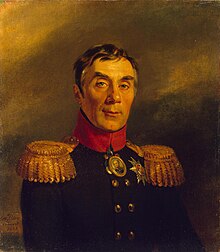Alexei Andreevich Araktschejew
Count Aleksey Arakcheyev ( Russian Алексей Андреевич Аракчеев , scientific transliteration. Aleksej Andreevič Arakčeev ; born September 23 . Jul / 4. October 1769 greg. In Bezhetsk , governorship Tver , † April 21 jul. / 3. May 1834 greg. In Grusino, Novgorod Governorate ) was a general in the Russian Army from an old noble family in Novgorod Governorate; from 1808 he was Minister of War and then also a member of the Council of State .
Life
Araktschejew comes from a landowning family in the Tver region. His military training in the artillery and engineer cadet corps he completed on October 8, 1787 with the rank of lieutenant. After that he remained in this corps as instructor and head of the library. From 1790 to 1792 he was adjutant to the director of the Cadet Corps. In 1792 Araktschejew took command of the artillery in Gatchina , near St. Petersburg, as a captain . Due to his good contact with Paul , he was promoted quickly. In just three years he became a colonel. After Paul became Russian emperor in 1796, Araktschejew became major general , commander of the Preobrazhensk body guard regiment and commander of Saint Petersburg that same year . On April 16, 1797 he was awarded the title of baron. A few days later, on April 30, he became Quartermaster General of the Russian Army.
On March 29, 1798 Araktschejew was dismissed by Paul with the rank of lieutenant general. Less than a year later, in January 1799, Paul hired him again and appointed him commander of the bodyguard artillery and inspector of the Russian artillery. On May 16, Araktschejew was appointed Count of the Russian Empire.
In the autumn of 1799 Araktschejew was released from the army again because he had covered his brother's financial machinations. He stayed at his Grusino estate for four years, with the exception of a short trip to Saint Petersburg on the evening of the murder of Paul I. In 1803, Alexander I reinstated him in his previous position as artillery inspector and commissioned him to modernize Russian artillery . On July 9, 1807 Araktschejew was appointed general of the artillery. In 1808 Alexander appointed him Minister of War. In addition to his role as inspector general of the artillery, Araktschejew was also appointed inspector general of the infantry in the same year. In September 1808, the Rostov Musketeer Regiment was renamed Count Araktschejews Musketeer Regiment (later Grenadier Regiment). In 1809 he was awarded the Order of the Black Eagle , the highest order in the Kingdom of Prussia . In the Russian campaign in 1812 , at the beginning of the war, he belonged to the imperial headquarters, but left the army with the Russian emperor and went to St. Petersburg. It was not until December 1812 that he returned to the army with Alexander I. In April 1814 Alexander appointed Araktschejew field marshal, but Araktschejew asked for this appointment to be reversed. He didn't want to command troops. Araktschejew was a brilliant theorist, but under fire he panicked.
From 1815 he directed almost all state affairs, since from 1818 at the latest Alexander was almost exclusively concerned with foreign politics. Adopted by Tsar Nicholas in 1825 , Araktschejew withdrew to his Grusino estate. In 1833 he donated a capital, which, through interest payments, had grown to two million rubles by 1925, was to be paid out as the prize for the best biography of Alexander I.
Alexei Andrejewitsch Araktschejew died on May 3, 1834 on his Grusino estate. His Grusino castle there was destroyed during the fighting of Volkhov during World War II.
literature
- Alexander Mikaberidze "The Russian Officer Corps in the Revolutionary and Napoleonic Wars, 1792-1815", Savas Beatie LLC, New York 2005, ISBN 1-932714-02-2
| personal data | |
|---|---|
| SURNAME | Araktschejew, Alexei Andrejewitsch |
| ALTERNATIVE NAMES | Аракчеев, Алексей Андреевич (Russian spelling) |
| BRIEF DESCRIPTION | Russian general |
| DATE OF BIRTH | October 4, 1769 |
| PLACE OF BIRTH | Beschezk |
| DATE OF DEATH | May 3, 1834 |
| Place of death | Grusino |
